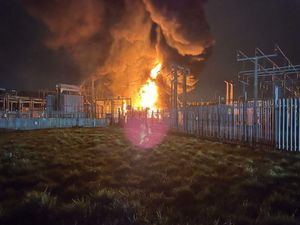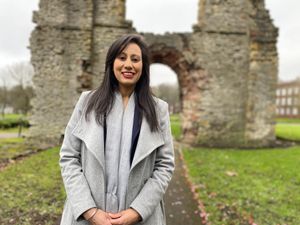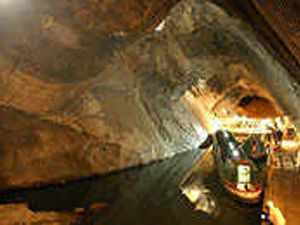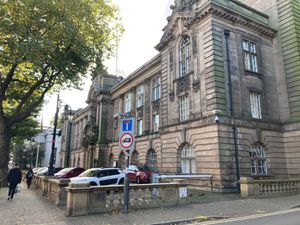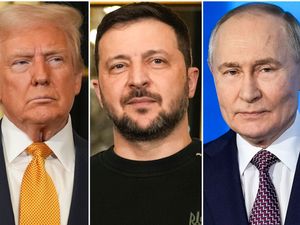Nigel Farage INTERVIEW: Why Tory failings could derail Brexit
Nigel Farage says he fears Brexit may never happen due to the Conservatives woeful General Election result paving the way for Remainers to block it.
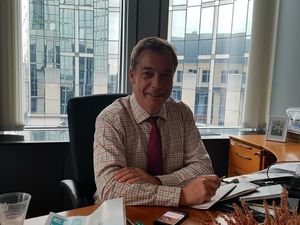
In an exclusive interview with the Express & Star, the former UKIP leader said it was inevitable that Brexit would be watered down after the Government lost its majority on June 8.
But he said the ‘worst case scenario’ would be a second referendum.
Meanwhile Mr Farage said he could still make a reluctant return to party leadership, after admitting that UKIP had been ‘usurped’ in the General Election and was seen as ‘irrelevant’ by voters.
He also said UKIP needed to be cautious over far right elements gaining prominence within party ranks.
It came as he delivered a speech to UKIP’s MEPs at an emergency meeting in Brussels, calling for a period of calm as the party seeks its fourth leader in a little more than a year.
Speaking at his office at the European Parliament, Mr Farage said: “After the General Election result my real concern is that the problem for Brexit now isn’t in Brussels, it is in Westminster.
“There’s been a shift of emphasis. I worry about the parliamentary arithmetic.
“I was told by a very senior Tory that everything is fine and that in the end Anna Soubry will toe the party line. Well...we’ll see. There is a fair bit of doubt over this it seems to me.”
Mr Farage said it was ‘a real problem’ for the prospects of Brexit that Mrs May’s administration had been ‘significantly weakened’ in the General Election. He added: “On the Tory benches there are 180 who voted Remain.
“You put all of them up against the wall, are they genuine converts to Brexit? No. I think the gap between the ordinary people are Parliament is wider now than it was before Brexit.”
He added that the immigration issue had ‘almost disappeared from view’. “We’re not even debating the 538,000 population increase last year, or the fact that the former boss of the Home Office says that illegal immigration could now be a quarter of a million a year,” he said.
“There are some very big disconnects that are still there. I certainly expect a watering down [of Brexit], but the worst case scenario is a second referendum.”
On Tuesday Mr Farage delivered a speech at a behind-closed-doors meeting of UKIP MEPs in Brussels, that was also attended by party chairman Paul Oakden and acting leader Steve Crowther.
He was bidding to calm tensions amid fears the upcoming leadership election could see the party split between so called moderate libertarians including West Midlands MEPs’ Bill Etheridge, James Carver and Jill Seymour, and hard right Islamophobes such as Anne Marie Waters.
Mr Farage said UKIP had serious issues to contend with after its vote share was decimated in the General Election. He said there was still a big role for the party in politics, but admitted he would prefer not to be at the helm.
“UKIP has been usurped and were seen by voters in the election as irrelevant,” he said. He added that UKIP had ‘lost its dominant figure’ after he stepped down in the wake of the referendum and was losing the battle of ‘the little boys against the big boys’.
“I’m not saying I accept responsibility, but it is a fact of life that if I’m not there it is quite difficult for someone else to come in and not have very long to get their feet under the table and lead a national campaign,” he said.
“UKIP has got some big structural problems. It’s got some big management problems. It’s got one or two perception problems. It has to sort out its new leader.
“If I am even half right about the type of backsliding we could see [on Brexit] two years down the road then there’s going to be a big role for UKIP, or somebody like UKIP.
“This was created as a vehicle to change the dynamic in British politics. I think we did that very dramatically.”
On the potential for him to return to leadership, Mr Farage said: “I did my bit and at the end of June last year there wasn’t much more I could do.
“I’m not happy to see [UKIP] the way that it is, but it doesn’t keep me awake at night.
“I’m looking at it, I’m thinking about it. I would need to be reassured that if I became leader again I could actually lead.
“That’s something which in 2015 and 2016 was very difficult.” He added: “Do I really want to come back to this? No. But that doesn’t mean I won't. UKIP won’t disappear whatever happens, but if UKIP isn’t strong you may see a new hard right type of thing emerge. Those sort of far right elements were not welcome in UKIP when I was leading it and not one of them reached any position of prominence.
“I was pretty clear as to what our direction of travel was. UKIP does need to be cautious about that.”

